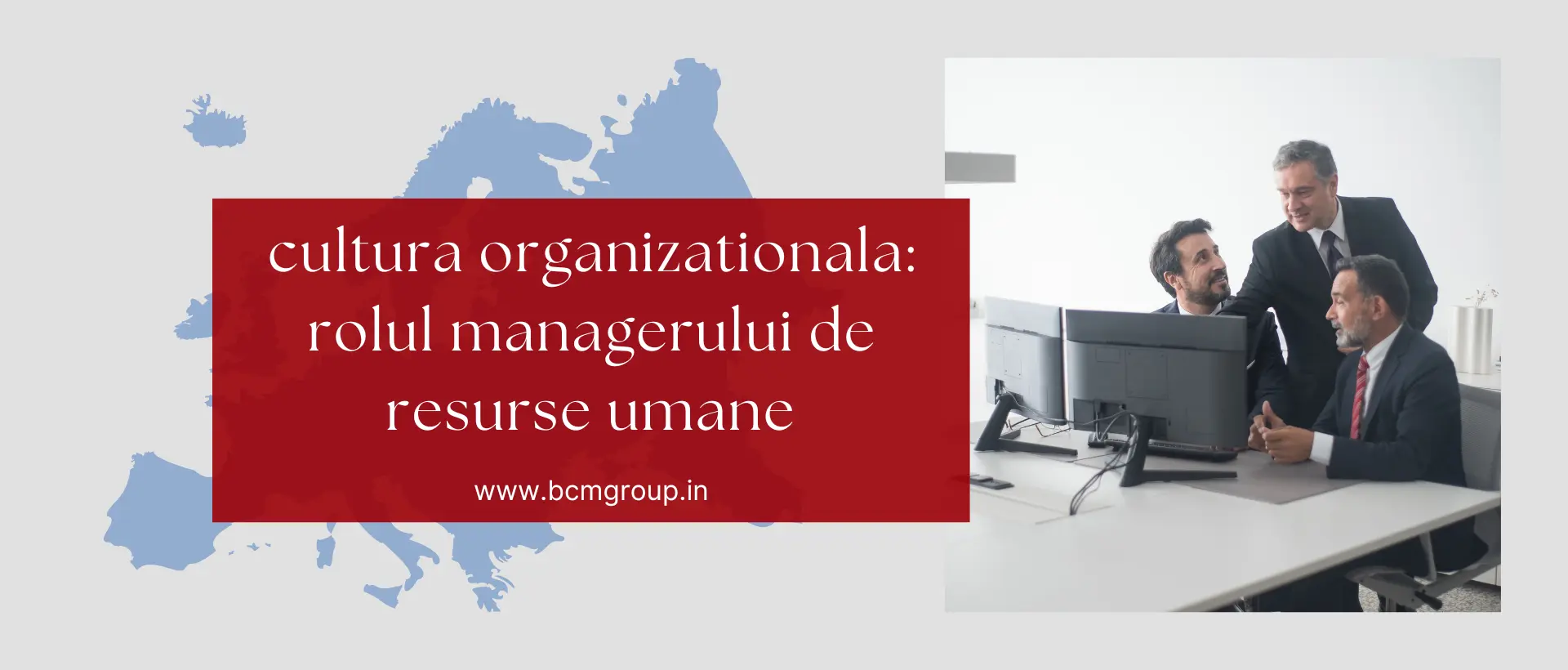
Organizational culture [cultura organizationala] is one of the crucial determinants that outlines the prospects of organizational functioning and performance. In its broadest sense, it refers to the set of assumptions held by an organization that determines its behavior and the behavior of its members in the workplace.
In this connection, the Human Resource Manager [Manager Resurse Umane] has a critical role to perform. While the organizations in Romania and in general the European countries are in the process of improving operational performance, it is the responsibility of the HR Manager [Manager HR] to cultivate, sustain, and remodel the organizational culture [cultura organizationala] that fits the organization’s strategic vision. This task is particularly crucial in organizations that rely on welfare solutions.
Organizational culture [cultura organizationala] is not just the internal climate it tells a company and its employees how things are going to be done. The right organizational culture is expected of human resource managers since it has a direct influence on people’s behavior, fosters cohesion, and increases morale. This is particularly the case for Romania-based MNEs because workers originate from a variety of cultural backgrounds.
An HR manager needs to match organizational values to those of the employees because it can determine the employees’ loyalty, job satisfaction, and consequently efficiency. This process starts at the time of recruitment of the employees and continues till the end of the recruiting Cycle; employee training, development and performance appraisal, and the right climate to maintain focus on the improvement cycle.
The following are a few models of organizational culture [cultura organizationala] that can assist HR professionals in having a clear perception of the environment. For example, the Handy Model categorizes organizational cultures into four types: power culture, role culture, task culture, and person culture. These classifications make it easier for HR managers to identify the culture that can suit their organizations and how best to introduce the culture. Schein’s Organizational Culture [cultura organizationala] Model defines three layers of culture: artifacts, operational beliefs and assumptions, and layers that can be recognized, discussed, and assessed by HR professionals to better understand the existing state of organizational cultures and what can be done to enhance them.
In Romania, HR managers need to effectively understand and incorporate cultural diversity into organizational culture. These models assist the HR managers in handling the issues of cultural assimilation with a view of promoting the best organizational culture as instituted by the company.
The HR managers function as the builders of organizational culture [cultura organizationala] since they are responsible for formulating organizational policies, determining the organization’s expectations as well as designing programs that will help support the organizational mission statement and vision. It is not merely about being in charge of recruitment and the processing of employees’ salaries. For instance, an HR manager operating in Romania can facilitate training aimed at increasing the organizational commitment of foreign employees thus giving the employees a sense of organizational culture. Besides helping to enhance productivity, it also produces strong identification and commitment to one’s work.
Further, it becomes the conceptual responsibility of the HR managers to ensure that communication is open throughout the organization. In this way, the tendency of giving the employees a platform to voice out their ideas and issues helps the HR managers build a platform of innovation. This in turn overall enhances the performance of the organization and also creates a happy atmosphere for employees.
As more European companies have recently started sourcing their workforce from countries like India, there is massive emphasis put on cultural compliance. It is the reason that establishing a coherent organizational culture is HR managers’ ability to combine one or multiple diverse workforces. In particular, Romanian HR managers need to pay much attention to the reduction of cultural gaps and the enhancement of employees’ mutual understanding.
Socialization starts with massive company instructions that precede programs to acculturate the newcomer into the organization. Training and development not only consists of teaching an employee or training a workforce after the recruitment and selection process but also involves having a close follow-up to ensure that the trained personnel is in harmony with the organization’s policies.
The Human Resource Manager plays an important and complex role in the formation of organizational culture that is crucial for the effective functioning of the organization. As much as involving all employees in free and constructive discussions to ensure timely resolution of issues and realizing organizational goals and objectives, CEO and HR managers are the key players who contribute significantly towards creating a good organizational culture.
In many countries such as Romania, many companies are beginning to source international workers from providers such as BCM Group India thus the need for HR managers to mediate any perceived or real cultural differences. HR managers can leverage the right models of organizational culture to establish organizational settings that foster participation, creativity, and organizational performance.
SEDIU
409, Etajul 4, Amanora Chambers, Amanora Mall, Lângă orașul Magarpatta, Hadapsar, Pune – 411028,
BCM Group Global Manpower SRL, Romania
Pentru solicitanții de locuri de muncă
Pentru Companii
Pentru Companii

Înregistrat sub Ministry of External Affairs
License No. MUMBAI/PARTNERSHIP/5493853/2021
© 2024–2025 bcmgroup. Toate drepturile rezervate.
Acest site este protejat de reCAPTCHA și se aplică Politica de confidențialitate și Termenii și condițiile Google.